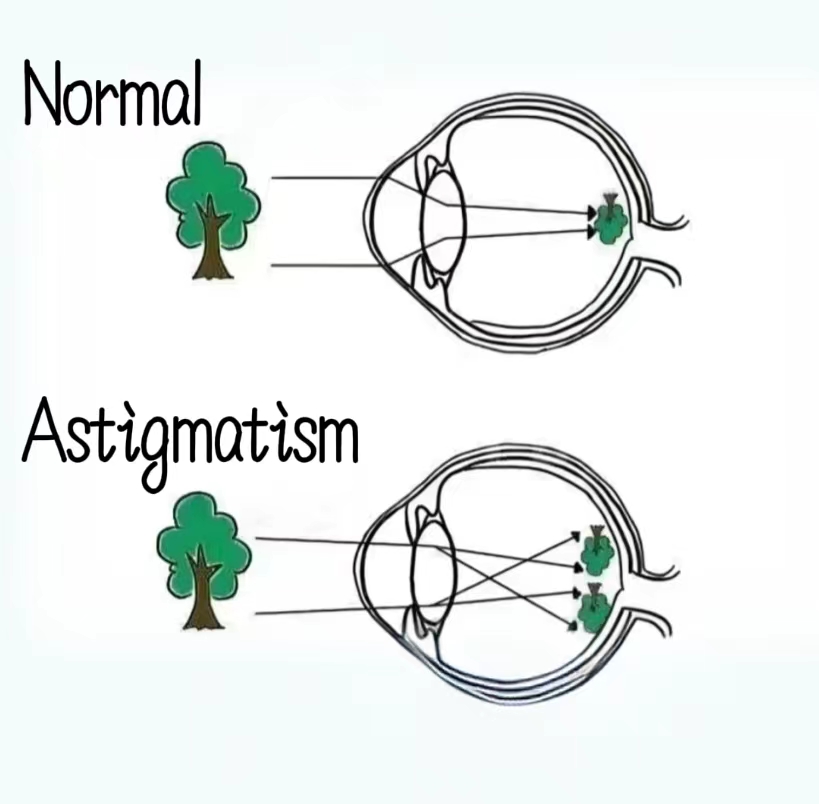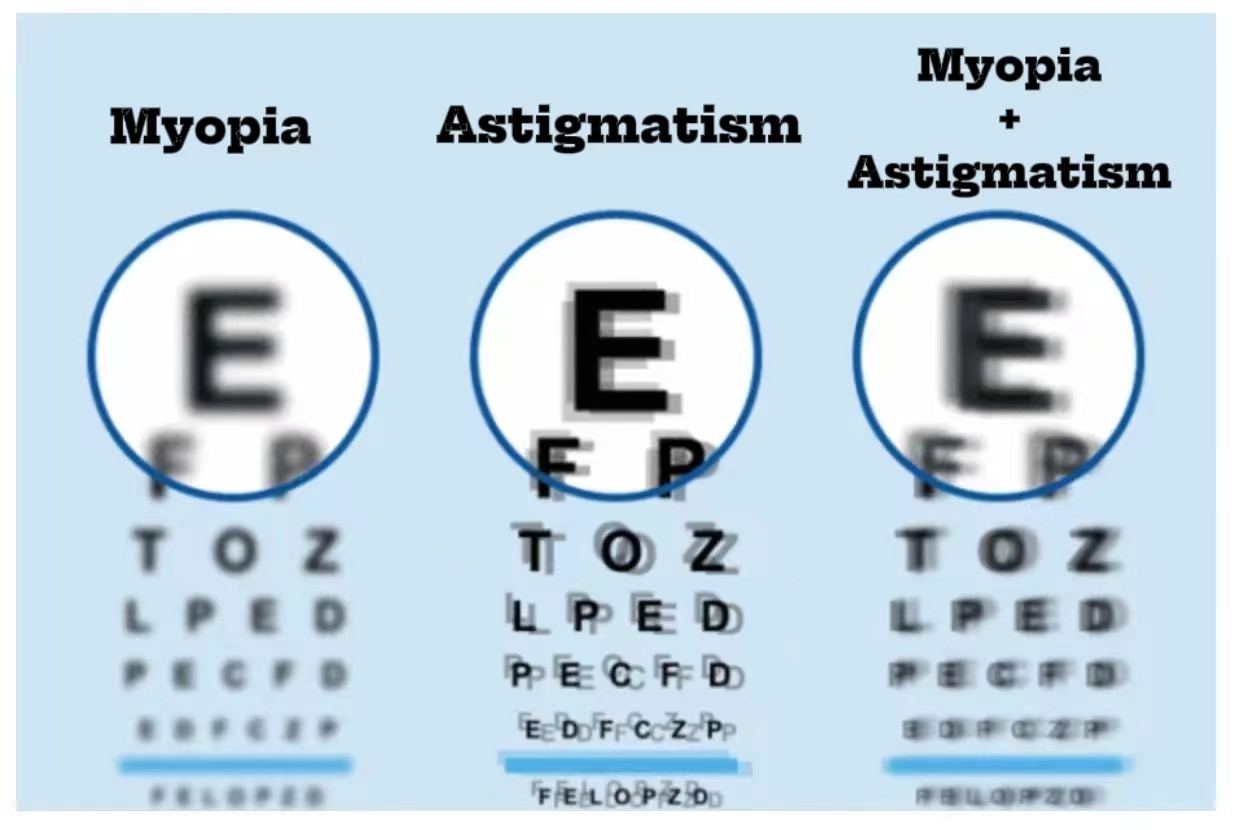Are you intrigued by the idea of wearing regular contacts with astigmatism? Wondering if it's possible to achieve clear, vibrant vision with colored contacts designed for this unique condition? This article will help you understand the main questions you are curious about astigmatism and better choose contact lenses suitable for astigmatism people.
What is Astigmatism?
Astigmatism is a visual refractive error characterized by blurred or distorted vision, arising from an irregular shape of the cornea or lens.
In a healthy eye, the cornea and lens exhibit smooth, uniformly curved surfaces. However, in cases of astigmatism, the irregular corneal or lenticular contour causes light rays to enter the eye with non-uniform curvature, leading to visual blurring and discomfort when observing objects at varying distances.

What are the Differences between Astigmatism and Myopia (Nearsightedness)?
Astigmatism and Myopia are both refractive eye conditions that share some similarities in symptoms and treatment, but also have many differences:
| Astigmatism | Myopia | |
| Causes | The cornea or lens is irregularly shaped, causing light to scatter and blur vision. | The eyeball is longer than normal or the cornea is overly curved, causing light to focus in front of the retina rather than directly on it. |
| Symptoms |
|
|
| Effect on Vision | Difficult to see near and far objects, as they appear blurred or distorted | Affecting distance vision because distant objects look blurry |
| Prevalence | More common | Increasing globally |

If you have concerns about your vision, it's always best to consult with an eye care professional for a proper diagnosis and appropriate treatment plan. They can provide an accurate assessment and recommend the right corrective measures for your specific situation.
Can I Wear Contacts with Astigmatism?
Definitely yes, individuals with astigmatism can indeed wear contact lenses to correct their vision. Nonetheless, as individuals have varying levels of nearsightedness and astigmatism, it is essential to meticulously select the contact lenses that are suitable for your specific needs.
Is it Better to Wear Glasses than Contacts for People with Astigmatism?
No, the choice between glasses and contacts for individuals with astigmatism ultimately depends on personal preference and lifestyle. While glasses provide a convenient and reliable option for vision correction, many individuals prefer the freedom and aesthetic appeal of contact lenses. With the advancement of contact lenses, individuals with astigmatism can enjoy the benefits of clear vision and comfortable contact lens wear.
Can I Wear Regular Contacts if I Have Astigmatism?
Absolutely yes. People with low astigmatism may be able to wear regular contact lenses, but the choice should be made based on individual circumstances and professional advice.
- If you have between -2.00 and +2.00 diopters of astigmatism, you can wear regular contact lenses. You simply need to change the power of your contact lenses according to the corresponding prescription, guaranteeing clear vision.
- For astigmatism beyond that range, you should select specially designed toric contact lenses, as this type of contact lens can better correct high diopters of astigmatism.
Overall, even those with mild astigmatism may benefit from contact lenses. It's important to consult an ophthalmologist to select the right type and strength for optimal vision correction and comfort.
Does astigmatism affect contacts' prescription strength?
Yes, astigmatism does affect the prescription strength of contacts. When determining the prescription for contacts, the diopter of astigmatism is taken into account, and the prescription will include both the correction for nearsightedness or farsightedness as well as the specific correction for astigmatism.
In Unibling, if you have astigmatism and a low prescription, consider adding a little extra power to your contact lenses. For example, if you have a myopic (nearsighted) prescription of -4.00 diopters with -0.50 diopters of astigmatism, you can choose contact lenses with a power of -4.25 diopters.

Unibling Bloom Blue Colored Contacts - A Wide Range of Prescriptions (-8.00D - 0.00) for Your Special Need
Does Wearing Colored Contacts Impair the Eyes of People with Astigmatism?
No, wearing colored contacts does not inherently impair the eyes of people with astigmatism. As contact lens technology evolves, they are now deemed almost as safe as standard contact lenses. In the United States, colored contact lenses are classified as medical devices, subjecting them to strict monitoring by the Food and Drug Administration (FDA) to ensure their safe production, prescription, promotion, and utilization.
Unibling contacts are FDA approved and have obtained both FDA and CE certifications. Its products are in compliance with regulations for marketing and selling in both U.S. FDA and EEA markets.

Unibling Niagara Colored Contact Lenses - Unibling Provides You Safest Colored Contacts
Improving Visual Acuity with Contacts for Astigmatism
Individuals with astigmatism can opt for contact lenses for vision correction. Considering individual preferences and vision requirements and following the guidance of experts, selecting the right contact lenses can provide optimal protection for the eyes. Additionally, wearing colored contacts does not inherently harm the eyes of people with astigmatism, but it's better to consult an optometrist for proper fitting and prescription to avoid potential issues.

